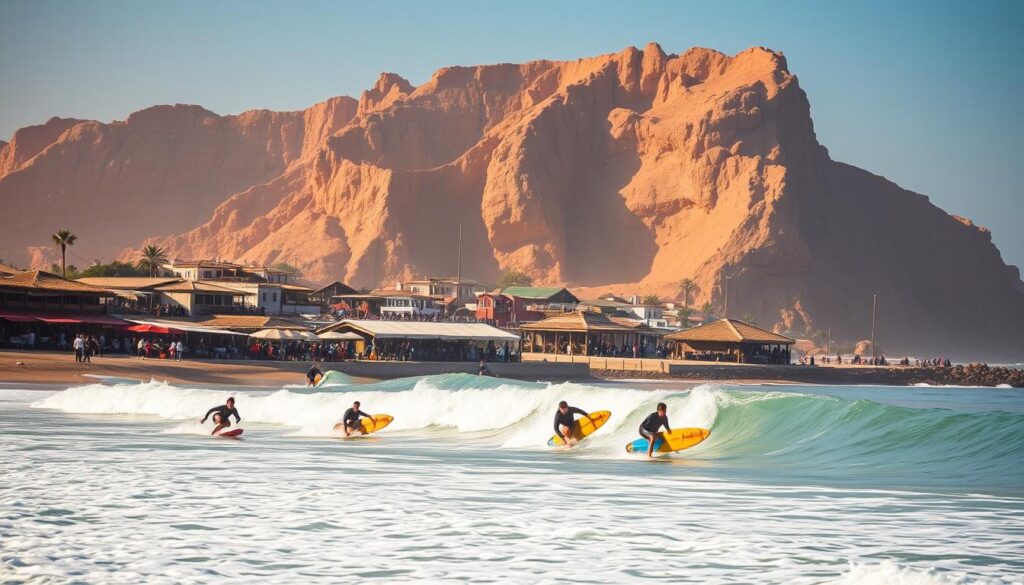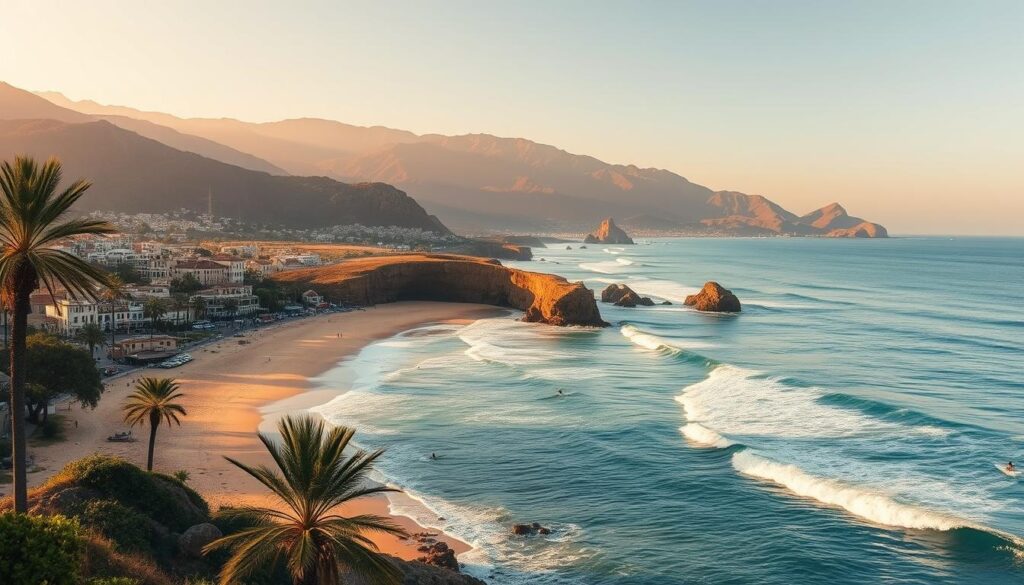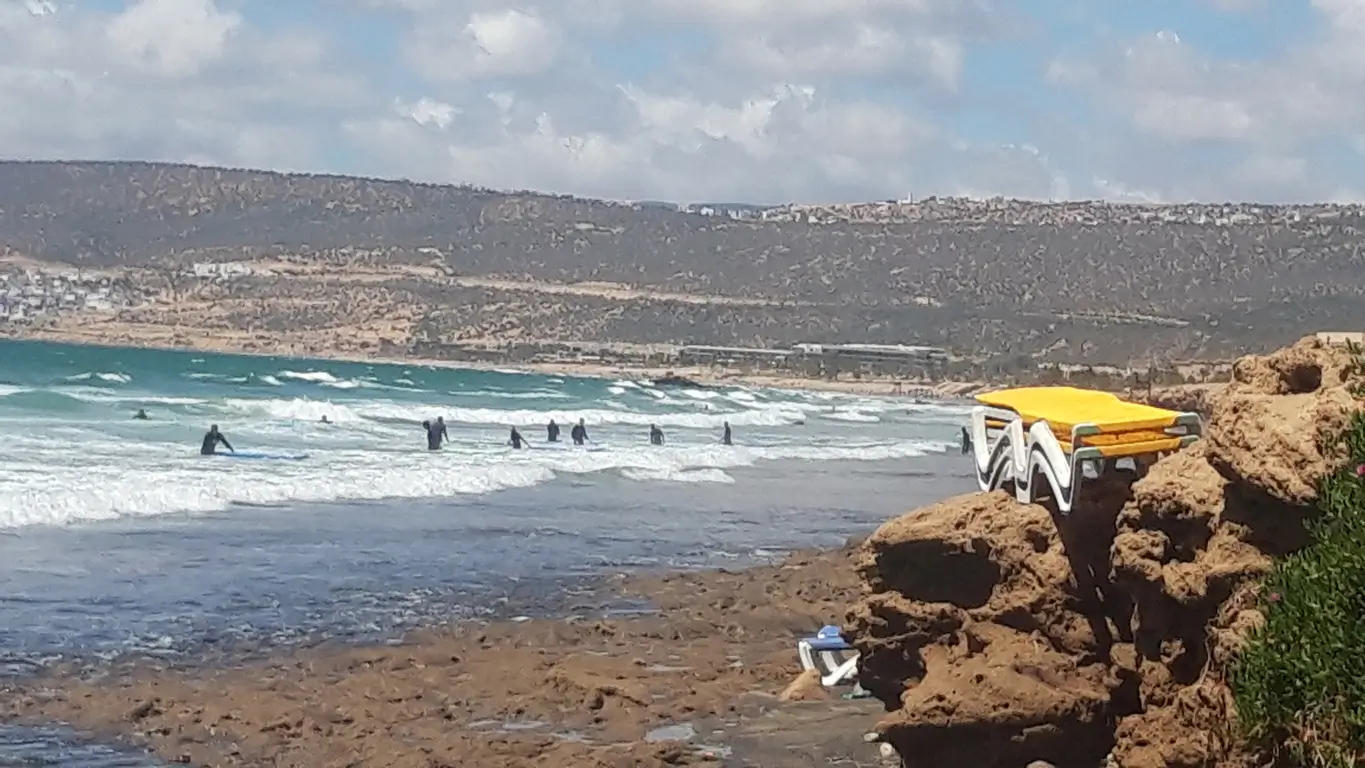Crocro Beach Chronicles: 3 Reasons Surfers Love This Beach
Table of Contents
Imagine standing at the edge of adventure, where the Atlantic Ocean meets Morocco’s rugged coast. The waves of Crocro Beach Chronicles call to surfers worldwide, telling stories of passion, challenge, and connection. These stories are not just about riding waves; they’re about personal growth and exploring new cultures.
Crocro Beach surf stories show what makes this place special. It changes from a quiet beach to a lively spot for surfers in peak season. The waves promise excitement, testing surfers’ skills against the ocean’s power.
Every wave has its own story. From the morning sessions loved by locals to the international competitions, Crocro Beach Chronicles is more than a surfing spot. It’s a community of wave riders and dreamers.
Key Takeaways
- Crocro Beach Chronicles offers unique surfing experiences with waves ranging from 1.5 to 2 meters.
- Peak surf season runs from October to April
- The beach attracts both local and international surfers
- Surfing here is more than a sport – it’s a cultural experience
- The local community thrives on surf tourism and beach activities
The Rise of Moroccan Surf Culture
Surfing in Morocco has grown from a small hobby to a big coastal movement. The history of surfing in Morocco shows how culture and passion for the sea have merged. With over 1,835 kilometers of coastline, Morocco is now a top spot for surfers from all over.

The growth of Moroccan surf culture came from several important steps:
- Introduction of surfing by European travelers in the 1960s
- Gradual local community engagement with the sport
- Establishment of the first surf schools along the Atlantic coast
- Growing international recognition of Morocco’s world-class waves
Traditional Coastal Heritage
Coastal communities in Morocco have long maritime traditions. These traditions blended well with surf culture. Traditional maritime skills translated naturally into surfing techniques.
Modern Surf Movement Evolution
The modern Moroccan surf movement has seen huge growth. Here are some stats that show this:
- 20% annual growth in surf tourism
- 150% increase in surf schools since 2018
- 40% increase in local surf-related employment
- 75% rise in local surf competition participation
Cultural Integration of Surfing
Surfing in Morocco is more than a sport—it’s a way to connect local traditions with the world. Tourists and locals surf together, forming a community that values both heritage and adventure.
Legendary Surf Spots Along the Moroccan Coast

The Moroccan coast is a paradise for surfers, with incredible waves for all levels. The Atlantic coast of Morocco is a haven for surfers. It has spots for every skill and wave type.
Taghazout is the top spot for surfing in Morocco. This small fishing village has become a global surf hotspot. It attracts surfers from everywhere with its famous breaks and consistent waves.
- Anchor Point: A legendary right-hand point break that delivers long, perfect rides
- Killer Point: Known for its challenging waves and spectacular scenery
- Banana Beach: An ideal spot for beginners and intermediate surfers
“Morocco’s waves are not just about surfing; they’re about experiencing a perfect blend of natural beauty and cultural richness.” – Professional Surf Traveler
There are more amazing surf spots along the Moroccan coast. Essaouira is great for kitesurfing with its consistent winds. Sidi Kaouki offers secluded and raw surfing experiences. Each spot adds its charm to the Moroccan surf scene.
Whether you’re a pro or just starting, Morocco’s coast has something for everyone. It promises an unforgettable surfing adventure.
Crocro Beach Chronicles: Surfer Stories from the Moroccan Waves
Surfing in Morocco is filled with stories that show the country’s coastal spirit. These tales come from both local heroes and international surfers. They paint a picture of a community that’s passionate and strong.
The surfing world in Morocco is full of personal stories. Each one tells a tale of connection, challenge, and victory.
Local Heroes and Their Tales
Moroccan surf champions started from simple beginnings. They turned their love for the sea into amazing achievements. Their stories include:
- Overcoming economic challenges
- Learning surfing with community help
- Building professional careers
International Surfer Experiences
Surfers from all over the world come to Crocro Beach Chronicles Morocco for its famous waves. They talk about the mix of cultural experiences and top-notch surfing that Morocco offers.
Community Impact Stories
Surfing in Crocro Beach Chronicles Morocco is more than just a sport. It’s a force for good. It brings economic growth, cultural exchange, and awareness of the environment to local communities.
“Our waves tell stories of connection and transformation,” says a local surf instructor.
Exploring the Crocro Beach Chronicles surf scene shows a world where waves mean more than just a sport. They stand for hope, strength, and cultural identity.
Seasonal Surfing Patterns and Wave Conditions
Knowing the seasonal changes in Moroccan surf spots is key for any surfer. The waves along the coast change a lot throughout the year. This creates special chances for surfers to enjoy.
In the summer (June to August), Crocro Beach Chronicles is a dream spot for surfers. The best waves come during this time, drawing surfers from everywhere. About 70% of the year’s surf action happens then, with waves from 1.5 to 2.5 meters high.
- Summer peak season: June to August
- Wave height: 1.5 – 2.5 meters
- Optimal surfing conditions: 60% of the time
- Preferred surf times: 7 AM to 10 AM
Fall (September to November) is the best time for surfing. Data shows 75% of days have great waves. The winds are also perfect, with 65% of days ideal for surfing.
“The waves here tell a story of their own, changing with each season’s breath.” – Local Moroccan Surfer
| Season | Wave Conditions | Surfer Attendance |
|---|---|---|
| Summer | Optimal (60%) | Peak (100%) |
| Fall | Excellent (75%) | High (80%) |
| Winter | Limited (40%) | Low (50%) |
| Spring | Moderate (50%) | Moderate (60%) |
Winter brings a different challenge for surfers in Morocco. Waves are smaller, and fewer surfers come. This shows how important it is to plan well for the best surfing experience.
Sustainable Surf Tourism and Local Economy
The surfer lifestyle in Morocco is a mix of caring for the environment and creating jobs. Coastal towns have turned surfing into a way to make money and keep their culture alive. This helps local people find good jobs and enjoy their heritage.
Surf tourism in Morocco is helping communities grow. Places like Taghazout and Crocro Beach Chronicles have seen big changes. Local businesses offer surf camps, rentals, and places to stay, boosting the local economy. It also draws travelers looking for real experiences, not just tourist traps.
Environmental Conservation Efforts
Surf communities in Morocco are leading the way in protecting the environment. They work with global groups to clean beaches, manage waste, and save marine life. This keeps the coast beautiful and supports tourism that cares for the planet.
Economic Benefits for Coastal Communities
Surf tourism brings a lot of money to Morocco’s coast. Young people get jobs teaching surfing, linking fishing traditions to tourism. Better roads, training, and more visitors have made these areas famous for surfing.
Cultural Exchange Programs
Morocco’s surf culture connects people from all over. Surf workshops, cultural exchanges, and green projects build respect and understanding. These efforts promote tourism that’s good for the planet and strengthen bonds between locals and surfers worldwide.

